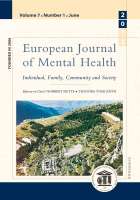Ein ökumenisches Modell der Weiterbildung in Seelsorge: Geschichte und Ergebnisse der Evaluationsforschung der Weiterbildung
Presenting a Model of Ecumenical Spiritual Counselling Studies and the Results of an Evaluation
Author(s): Teodóra Tomcsányi, Gábor Semsey, András Ittzés, Gábor Pál Török, Tímea Tésenyi, Tamás Martos, Tünde SzabóSubject(s): Christian Theology and Religion
Published by: Semmelweis Egyetem Mentálhigiéné Intézet
Keywords: spiritual counselling; spiritual counselling competences; course management; evaluational research; history of spiritual counselling; specialised postgraduate studies in Hungary
Summary/Abstract: The study gives an overview of the specialised postgraduate program in Spiritual Counselling founded and started by the Institute of Mental Health at the Semmelweis University in Budapest. It analyses the historical factors and other aspects that played a role in launching and developing the program and influenced educational management. The groundbreaking nature of the program is emphasised as well. The specialised program is run in cooperation by a state university and two Christian institutes of higher education. Its curriculum comprises theoretical and practical knowledge from different academic fields such as psychology, educational studies, social studies and health studies, taking into consideration the graduate studies and previous experience of students and integrating all this knowledge into the theological qualification already acquired. The course pays special attention to the development of personality including the understanding of one’s own life history and spiritual history which is a process based on gaining self-awareness and transforming spiritual lifestyle. The second half of the article presents the results of the studies supporting the launch and development of the postgraduate course. The longitudinal study (n = 55; 2005–2008) contains a 300-item version of the California Psychological Inventory Scales (CPI-S) as well as the results of a questionnaire designed by our own institute and measuring the conversation competence of counsellors. The normal CPI profile of the whole sample and the stability of the various scales show that the course does not significantly change the main personality traits of students. This, however, also means that the application procedure is effective enough, which is an important factor regarding the efficiency of the whole program. The survey on the components of conversational competence, which integrates all fields of the program, indicates that a good percentage of the students, having a variety of experiential background, went through the required competential change in several significant areas. The change was significant in the recognition of competence barriers, non-directivity, responsibility taken for the process and the quality of spiritual counselling. The frequency of occurrence of categories characterising higher helping competence increased in all cases.
Journal: European Journal of Mental Health
- Issue Year: 7/2012
- Issue No: 01
- Page Range: 24-56
- Page Count: 32
- Language: German

